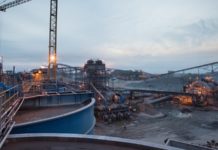[miningmx.com] — AMID all the bad news in South Africa – surging consumer and retail price inflation, deteriorating business confidence, plunging motor vehicle sales and a ballooning trade deficit – let’s at least take solace in the best news of the week: Rio Tinto has “suspended work’ on its aluminium smelter at Coega.
“Suspended’ looks like an understatement. Rio has said that 200 people were working on Coega, including 60 in South Africa; that team will be reduced to about seven. I won’t be surprised if natural attrition trims that number to about six; or about five; or about. . .
Rio says it “may resuscitate’ the project in three or four years. Well, we shall see. After all, in three or four years Rio may well not still be in existence as an independent company: on the same day it announced the Coega delay, BHP Billiton took the next steps in its formal bid for Rio.
And it’s not as if Rio has turned bearish on aluminium. In the same investor presentation last week that broke news of the Coega delay, it referred to plans to spend $1bn on expanding its Alma facility in Quebec, while next month production will start at the Sohar smelter in Oman, of which Rio is managing partner, and has a 20% equity stake.
With capacity of 360,000 tonnes per annum, this will be the largest potline in the world and be among the 10% lowest cost producers. A second potline is already being considered.
So the Coega decision is a direct consequence of South Africa’s inability to guarantee that Eskom will honour the electricity supply contract it so eagerly signed a couple of years ago.
Rio Tinto’s reassurance that Coega remains in its plans sounds like flannel, to me. Eskom is already warning us that power shortages will continue until at least 2013, which is already beyond the “three or four year’ nominal delay. If I were involved in Rio’s strategic planning, I would be putting Coega firmly on the back burner.
And for South Africa, that won’t be a bad thing. Aluminium smelters were a great way of absorbing spare generating capacity when it was available. I can remember at the time wondering idly what would happen when there was no more spare capacity and being reassured that I shouldn’t worry, Eskom’s continuuing expansion programme would ensure that this would never happen.
Well, we all know what happened to that.
The fact is that aluminium smelters, especially in a country with no supplies of the raw material, bauxite – which is one of the few minerals lacking in our rich resource base – are simply a way of exporting electricity. They don’t create many jobs, and the capital investment per job is enormous.
They were a luxury we could afford in the 1980s, but are now expensive white elephants that absorb capital and power that could much more productively employed elsewhere. In terms of power alone, an aluminium smelter consumes as much electricity as a medium-sized town.
Ironically, that’s the point that the unnamed senior Standard Bank executive – widely thought to be chairman Derek Cooper — made at a high-level get-together that caused BHP Billiton, owner of the Hillside smelter, to threaten to pull its R2.4bn-a-year business from the bank.
BHP Billiton called the executive’s remarks “reckless, provocative and irresponsible.’ Well, they may have been provocative, but in the circumstances I would call them neither reckless nor irresponsible, and the spirit behind them is justified by Rio’s decision.
This intemperate threat has now been withdrawn after Standard ate humble pie – and perhaps after BHP Billiton contemplated the dislocation to its business that firing Standard would have entailed. Happily, it’s all turned out to be a storm in a teacup, in which if anything it’s BHP Billiton that did its image more harm.










